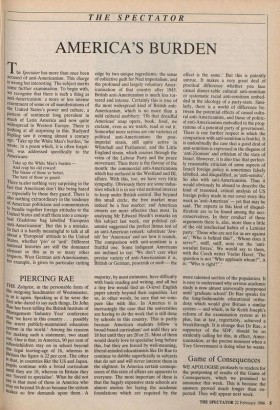THE SPECTATOR
AMERICA'S BURDEN
Take up the White Man's burden - And reap his old reward: The blame of those ye better,
The hate of those ye guard.
There is. also nothing very surprising in the fact that Americans don't like being hated — especially by those they guard. There is also nothing extraordinary in the tendency of American politicians and commentators to bundle together foreign attitudes to the United States and stuff them into a concep- tual Gladstone bag labelled 'European anti-Americanism'. But this is a mistake. In fact it is hardly meaningful to talk at all about a 'European' attitude to the United States, whether 'pro' or 'anti'. Different national histories are still the dominant element in this as in so many other respects. West German anti-Americanism, for example, is given its particular cutting edge by two unique ingredients: the sense of collective guilt for Nazi imperialism, and the profound and largely voluntary Amer- icanisation of that country after 1945. British anti-Americanism is much less tor- tured and intense. Certainly this is true of the most widespread kind of British anti- Americanism, which is no more than a mild cultural snobbery: 'Oh that dreadful American' soap opera, book, food, we exclaim, even as we watch, read or eat it. Somewhat more serious are our varieties of political anti-Americanism: the post- imperial strain, still quite active in Whitehall and Parliament, and the Little England strain, which courses through the veins of the Labour Party and the peace movement. Then there is the flavour of the month: the commercial anti-Americanism which has surfaced in the Westland and BL affairs. With this, too, we have very little sympathy. Obviously there are some indus- tries which it is in our vital national interest to keep under British control. But beyond this small circle, the free market must indeed be a free market: and American owners are more effective than most. In analysing Mr Edward Heath's remarks on this subject last week, our political col- umnist suggested the perfect litmus test of an anti-American remark: substitute 'Jew- ish' for 'American' and see how it sounds. The comparison with anti-semitism is a fruitful one. Some indignant Americans are inclined to say: 'We don't care what precise variety of anti-Americanism it is, British or German, peacenik or snob — the effect is the same.' But this is patently untrue. It makes a very great deal of practical difference whether you face casual dinner-table cultural anti-semitism or systematic racial anti-semitism embed- ded in the ideology of a party-state. Simi- larly, there is a world of difference be- tween the potential effects of casual cultu- ral anti-Americanism, and those of politic- al anti-Americanism embodied in the prog- ramme of a potential party of government. There is one further respect in which the comparison with anti-semitism is fruitful. It is undoubtedly the case that a good deal of anti-semitism is expressed in the disguise of `anti-Zionism' and criticism of the state of Israel. However, it is also true that perfect- ly reasonable criticism of some aspects of Israeli foreign policy is sometimes falsely labelled, and disqualified, as 'anti-semitic'. So also with anti-Americanism. Thus it would obviously be absurd to describe the kind of reasoned, critical analysis of US foreign policy made in our cover story this week as 'anti-American' — yet that may be said. The experts in this kind of disqual- ification are to be found among the neo- conservatives. In their conduct of these arguments there is, alas, more than a little of the old intellectual habits of a Leninist party: 'Those who are not for us are against us'; 'Who is behind this?', 'Whom does it serve?'; sniff, sniff, nose out the 'anti- socialist forces'. We would say to them, with the Czech writer Vaclav Havel, 'The question is not "Who applauds whom?", it is: "Who is right?".'














































 Previous page
Previous page